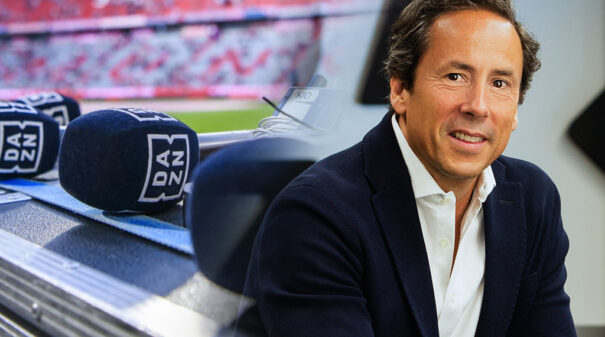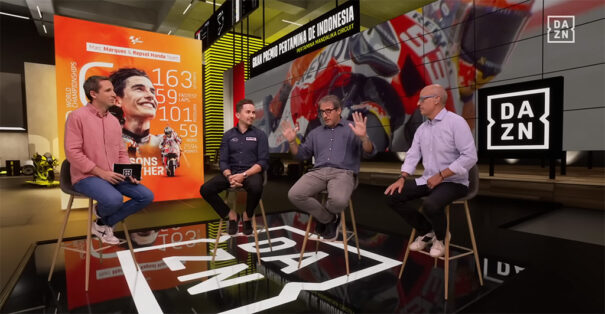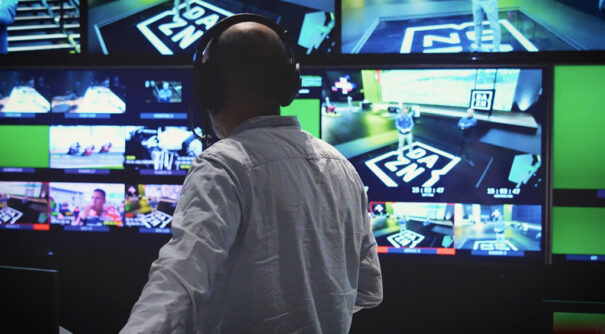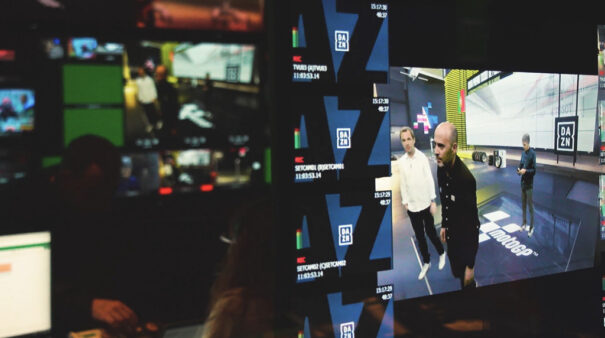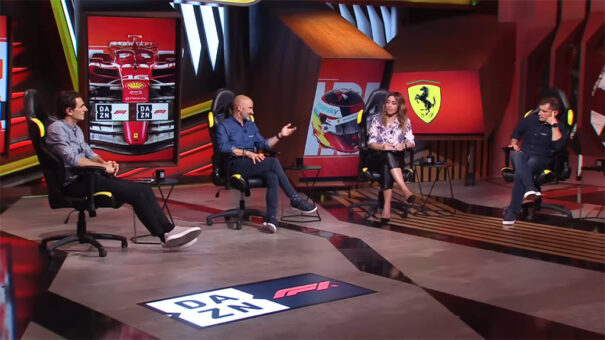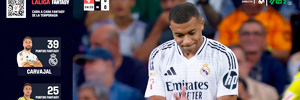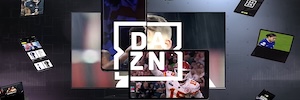Bosco Aranguren, CEO de DAZN España: “Las telcos son nuestra competencia, pero también nuestros partners”
El CEO de DAZN España, Bosco Aranguren, aborda en esta entrevista el estado de forma de la plataforma, sus retos en un mercado hipercompetitivo, la innovación tras la plataforma y los desafíos que conlleva llevar al consumidor tradicional de deporte a un nuevo ecosistema.
DAZN, con apenas siete años de vida en el mundo de las plataformas bajo demanda y cumpliendo cinco años en febrero de 2024 en España, ha jugado inteligentemente su partido para erigirse como una marca destacada en el mundo del video bajo demanda. Con decisiones estratégicas por mercados y una visión global centrada en el crecimiento y la experiencia del usuario, ha podido introducirse y consolidarse en un mercado de extrema competencia, marcado por las cada vez más agresivas subastas de derechos (de las que inevitablemente forman parte) y aludiendo directamente a un espectador que llevaba disfrutando de la experiencia deportiva de la misma manera desde hace décadas.
 Su presencia en España tuvo un lanzamiento suave con MotoGP and Fórmula 1, pero la explosión llegó como la propia marca reconoce con la adquisición de parte de los derechos de LaLiga, la máxima competición futbolística de España. Desde entonces, el número de abonados continúa creciendo, los recursos de producción se han multiplicado y su identidad se ha consolidado para dar a entender a los espectadores que la experiencia de DAZN no pasa únicamente por ser una ventana más para ver a su equipo favorito, sino una experiencia de visualización única en la oferta española.
Su presencia en España tuvo un lanzamiento suave con MotoGP and Fórmula 1, pero la explosión llegó como la propia marca reconoce con la adquisición de parte de los derechos de LaLiga, la máxima competición futbolística de España. Desde entonces, el número de abonados continúa creciendo, los recursos de producción se han multiplicado y su identidad se ha consolidado para dar a entender a los espectadores que la experiencia de DAZN no pasa únicamente por ser una ventana más para ver a su equipo favorito, sino una experiencia de visualización única en la oferta española.
A la espera del enésimo cambio de paradigma en el ecosistema de los derechos deportivos en España (posiblemente protagonizado por agentes internacionales de vídeo bajo demanda), Bosco Aranguren ayuda a comprender en esta entrevista la evolución y el presente de DAZN en España, uno de los principales mercados para la firma a nivel global.
España, mercado clave para DAZN
En apenas cinco meses se cumplirá el quinto aniversario de DAZN en España. ¿Cuáles fueron los objetivos que tenían al lanzar DAZN en el mercado español y en qué medida los han logrado alcanzar?
Cuando DAZN comenzó su andadura en España en 2019 teníamos muy clara la ambición de ser un player relevante dentro del mercado español, así como conseguir que España fuese uno de los principales mercados a nivel global. ¿Qué sucedió? Como te podrás imaginar, la pandemia: afectó de lleno a todos los eventos deportivos y nos hizo echar las riendas. Quizá no era el momento de hacer ese desembarco.
Todo cambió después de la pandemia, cuando adquirimos los derechos de LaLiga para cinco temporadas. La apuesta fue evidente, clara y fuerte. Es entonces cuando se refuerza todo el equipo y cuando entro yo. Desde entonces, España se ha consolidado como uno de los mercados referencia dentro de DAZN a nivel global, que son cuatro: Alemania, Italia, Japón y España.
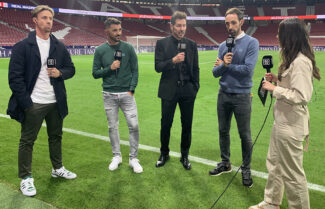 ¿Hasta qué punto obtener los derechos de LaLiga ha sido vital para el crecimiento y consolidación de DAZN en España?
¿Hasta qué punto obtener los derechos de LaLiga ha sido vital para el crecimiento y consolidación de DAZN en España?
El fútbol, básicamente, fue lo que nos permitió cambiar de dimensión. Que LaLiga pasara a formar parte de nuestros derechos tuvo un efecto muy positivo; directamente, duplicamos nuestro número de suscriptores.
El mundo del deporte está muy ligado a los directos, pero DAZN apuesta notoriamente por el contenido bajo demanda. En base a sus estadísticas, ¿el directo continúa siendo la opción predilecta para sus suscriptores en España?
A día de hoy, el directo sigue moviendo la aguja. Es el rey a nivel de contenido, pero sí que es cierto que intentamos complementar ese directo con nuestras propias producciones, puesto que ayuda a que el usuario encuentre más valor dentro de la plataforma. Creemos que el que realmente es fan de un deporte no lo es únicamente del directo, sino que también tiene curiosidad de descubrir más sobre las competiciones o los deportistas.
De hecho, insistimos muchos en el que la experiencia completa de DAZN se ofrece dentro de la plataforma, ya que te permite descubrir contenidos afines a tu deporte de referencia. Gracias a todo ese contenido, sabemos que el engagement que tiene un usuario en la plataforma es el triple del que puede tener a través de un canal lineal.
DAZN y la industria audiovisual española
¿De qué manera estructura DAZN España sus alianzas con la industria audiovisual para la producción de ese contenido original o para la personalización del contenido que gestionan?
El valor añadido que damos como DAZN es precisamente esa capa de personalización. Depende la competición o el deporte, pero siempre intentamos dar contexto en partidos o carreras haciendo una previa o un post. Todos estos formatos son de producción propia y los hacemos de distintas maneras. Puede ser desde estudio, donde apostamos por la innovación como puede ser con moto GP, o directamente en directo desde el campo de fútbol.
El 50% del equipo de DAZN España se dedica a la producción de contenido.
También nos hemos preocupado mucho no solo de lograr esa calidad de producción y cercanía con el público, sino también en buscar nuestro tono. Es algo que siempre comento con Quim Domènech (Ndr: Vicepresidente sénior de contenido en DAZN): para mí, el reto es que el espectador eligiera ver el contenido en DAZN incluso si este se pudiera ver en distintas plataformas o canales; ya sea por la forma de narrarlo, la experiencia a nivel de cliente o como consumidor.
¿DAZN España se apoya en equipos de producción internos para la creación de este tipo de contenidos?
Hacemos un modelo híbrido. Nos apoyamos en partners superreconocidos que nos garantizan calidad de producción y acceso a los recursos más punteros, pero también contamos con un amplio equipo interno: el 50% del equipo de DAZN España se dedica a la producción de contenido.
Interactividad y participación en las retransmisiones
DAZN España ofrece elementos participativos o interactivos durante las retransmisiones. ¿Considera que estos añadidos mejoran la experiencia del visionado deportivo y ayudan a posicionar a la plataforma en el mercado?
La forma de retransmitir un evento deportivo en directo no ha cambiado muchísimo en las últimas décadas. ¿Qué sucede? Que en el momento en el que una plataforma empieza a tener muchísimos datos, se da cuenta de que la forma tradicional de narrar y transmitir un evento deportivo no termina de enganchar a determinadas audiencias. Yo mismo tengo un hijo de 13 años que es un forofo del fútbol y, a no ser que hablemos de un Clásico o un Derbi, para él es muy difícil estar 90 minutos viendo un partido. Su consumo es radicalmente distinto, y no es el único grupo. Tengo muchos casos cercanos en el que la ventana de atención cada vez es menor, quizá por el exceso de impactos que recibimos durante el día, o que están acostumbrado a ver contenido con dos o tres pantallas al mismo tiempo.
En el momento en el que una plataforma empieza a tener muchísimos datos, se da cuenta de que la forma tradicional de narrar y transmitir un evento deportivo no termina de enganchar a determinadas audiencias.
Todo esto nos invita a reflexionar de qué manera podemos reenganchar a este tipo de usuario, que claramente demanda una experiencia distinta. De ahí surge DAZN X, nuestro centro de innovación, que trabajó en cómo ofrecer una experiencia mucho más interactiva. El resultado es La Grada de DAZN, un espacio de interacción en el que podemos comprobar que los datos de engagement al mismo tiempo que se retransmite el contenido son muy espectaculares. Es una experiencia que debutó en España y ha sido tan positiva que ya se está desarrollado para el resto de mercados.
¿Cuáles son los requisitos que el usuario acostumbrado a las emisiones deportivas más tradicionales demanda a DAZN? ¿Busca una mayor libertad? ¿Una experiencia ampliada?
En España, el fútbol es casi religión y el público lo ha consumido de la misma manera durante los últimos 40 años. Esto nos hizo pensar qué debíamos hacer. ¿Era necesario que les obligáramos a pasar a una experiencia OTT digital? La solución fue bastante específica y única, dado que preferimos ser disruptores, pero sin romper nada. Por eso, creamos alianzas con partners como Movistar Plus+ u Orange para que pudieran ver el fútbol a través de sus STBs.
Lo que sí que también hemos visto es que esa misma gente, que nos ve a través de la televisión lineal, protagonizan picos de activaciones en periodos festivos, cuando están en una segunda residencia o de vacaciones. La gente activa el acceso a través de la plataforma para ver el contenido y una vez que descubre esa experiencia, de repente se dan cuenta que acceder a contenido ampliado a través de la plataforma es mucho más sencillo.
DAZN ante el complejo mercado español
DAZN España entró en un mercado extremadamente competitivo con Movistar Plus+ como principal rival en lo que se refiere a la adquisición de derechos. ¿De qué manera se convive con un player tan relevante en la industria audiovisual?
Durante los últimos tiempos, y hasta la llegada de DAZN, los contenidos deportivos estaban muy vinculados a Movistar Plus+. Entonces llegamos nosotros con una propuesta inicial con MotoGP, Formula 1 y alguna competición adicional. Observamos que lo que estamos haciendo es entrar en un mercado muy competitivo dominado por un player que es Movistar Plus+. Podíamos hacer dos cosas: llevarnos a matar o intentar ser partners.
El modelo de Movistar Plus+ es de contenidos en altísima calidad, pero vinculados a una propuesta de conectividad, si bien ahora han lanzado otra propuesta diferente. Si quieres acceder a los contenidos, debes tener una línea fija, móvil, internet y servicio de televisión. Si vas sumando todos esos elementos te encuentras con una cuota mensual para acceder a los deportes que es elevada.
Observamos que lo que estábamos haciendo era entrar en un mercado muy competitivo dominado por un player que es Movistar Plus+. Podíamos hacer dos cosas: llevarnos a matar o intentar ser partners.
A nivel de mercado Español, las Telco que están sufriendo más son las grandes empresas que están manteniendo el valor con este tipo de iniciativas. En paralelo, irrumpen en el mercado players como Másmóvil or Digi con una propuesta de conectividad muy competitiva. Nosotros complementamos esa propuesta de conectividad a un precio asequible.
Para LaLiga, llegamos a un acuerdo con Movistar y con Orange para que sus usuarios pudieran seguir disfrutando de los 10 partidos. Y, además, lanzamos una propuesta de valor con un precio más atractivo para intentar llegar a una base mayor. Eso es lo que nos ha permitido evolucionar tanto. Por eso, las telco son nuestra competencia, pero también nuestros partners.
Plataformas de vídeo bajo demanda como Prime Video o Disney+ están apostando por la adquisición de derechos deportivos para reforzar su apuesta VOD. ¿Cómo afronta DAZN España la posible entrada de un nuevo competidor de tal calibre en el mercado español de los derechos deportivos?
En otros países como Francia o Alemania estos agentes están apostando el deporte. En España, lo que hemos hecho es llegar directamente a un acuerdo de distribución. Puedes acceder a nuestros contenidos a través de nuestro canal en Prime Video si eres cliente Prime de Amazon. Apostamos por un modelo que nos permita hacer que nuestros contenidos sean lo más accesibles posible.
Durante los últimos meses, las plataformas de vídeo bajo demanda se han enfrentado a un periodo inestable, marcada por una desaceleración en su crecimiento. Esto las ha llevado a optar por modelos publicitarios más agresivos o un cambio en sus tarifas. ¿Este replanteamiento del mercado VOD dedicado a la ficción y el entretenimiento también se ha visto extendido a DAZN?
Lógicamente, queremos que la zona España sea una empresa rentable y sostenible en el tiempo. Vivimos de los ingresos de los aficionados al deporte que pagan una suscripción por el acceso a nuestros contenidos. Pero también queremos ofrecer una serie de productos y servicios que puedan ser de interés para nuestros suscriptores de una manera muy prudente, poco intrusiva e intentado maximizar esa experiencia de cliente. Poco a poco, los suscriptores podrán ver más opciones de este tipo.
En octubre del año pasado lanzamos DAZN Bet, nuestro spin-off de apuestas, y vemos que efectivamente tiene sentido y está funcionando bien. También hemos llegado a acuerdos con Fanatics, para todo lo que es el merchandising, y con Daimani for tickets and hospitality de eventos deportivos.
UHD, FAST y oportunidades, en DAZN
¿Cómo afronta DAZN la demanda creciente de los usuarios por resoluciones como la UHD o por propuestas de audio inmersivo?
Es una demanda constante de los usuarios. Cuando accedes al contenido, y además ese contenido es en directo, quieres tener una experiencia brutal, independientemente de que lo veas en un móvil o en una pantalla grande. Eso nos ha obligado a ofrecer un output a nuestros contenidos en 1080p por defecto. Es un salto cualitativo importante, pero no nos queremos parar ahí. Si hay una necesidad tecnológica real por parte del usuario, inmediatamente pensamos qué significa a nivel de desarrollo y cómo podemos hacerles llegar esta experiencia. Estamos trabajando en ello y los resultados podrán verse en breve.
 Al margen de la experiencia de los directos y bajo demanda, DAZN España cuenta con varios canales lineales. ¿Estas experiencias son valiosas y significativas para el rendimiento de DAZN?
Al margen de la experiencia de los directos y bajo demanda, DAZN España cuenta con varios canales lineales. ¿Estas experiencias son valiosas y significativas para el rendimiento de DAZN?
Más allá de nuestros propios canales lineales, contamos con los de Eurosport y Red Bull, y los números a nivel de audiencia son buenos. No estamos cerrados para nada a albergar a otro tipo de canales en este sentido, ya que pueden coexistir perfectamente dentro de la plataforma. Fuera de ella, estamos explorando el mundo FAST hemos lanzado a nivel global dos canales, de deporte femenino y de boxeo, y Alemania está sirviendo como país piloto para otros canales de este tipo. Viendo las experiencias europeas, es posible que tengan su adaptación a España en el futuro.
Regresando al inminente quinto aniversario de DAZN en España, ¿de qué manera afronta la compañía su presente y futuro en el mercado?
El presente lo veo con orgullo, ya que nos hemos consolidado de una forma muy rápida. Cuando me incorporé a DAZN mis padres no sabían de qué les estaba hablando, pero a día de hoy cualquiera no solo conoce la marca, sino que sabe pronunciarla, lo que tiene mérito y es el resultado de un trabajo espectacular por parte del equipo.
Si hay una necesidad tecnológica real por parte del usuario, inmediatamente pensamos qué significa a nivel de desarrollo y cómo podemos hacerles llegar esta experience.
El futuro lo veo de manera muy optimista. Podemos observar que el consumo de deporte dentro de plataformas tecnológicas va a más y podemos acompañar este fenómeno con mejoras a nivel de calidad, tono y de experiencia de usuario. Queremos saber qué tipo de deportes son los que más atraen al usuario y ofrecerles de manera muy proactiva contenido para que encuentren valor cada vez que accedan a la plataforma.
A nivel de cosas que vendrán, seguro que vendrán muchas oportunidades, pero sí que hay un nubarrón en nuestro horizonte, que es el tema de la piratería. Me quita el sueño por las noches: no puede ser que España ocupe la tercera o la cuarta posición dentro del panorama europeo en lo que respecta al consumo de piratería. Esto nos dificulta llegara donde queremos y tiene repercusiones el usuario, toda la cadena de producción y la propia DAZN.
Una entrevista de Sergio Julián Gómez
Did you like this article?
Subscribe to us RSS feed And you will not miss anything.



